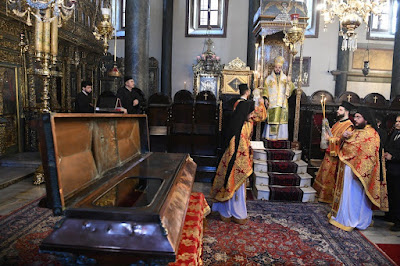Saint Theophano, 16 December
Ἐγγὺς Βασιλὶς Θεοφανὼ Κυρίου,
ταῖς ἀρεταῖς ἕστηκεν ἐστιλβωμένη.
Saint Theophano was born of eminent parents, Constantine and Anna, who were kin to several emperors. Her parents were childless for a long time and prayed to the Most-holy Theotokos to give them an offspring. And God gave them this daughter, Theophano. Imbued with the Christian spirit from her childhood, Theophano surpassed all her companions in all the Christian virtues. When she grew up, she entered into marriage with Leo, the son of Emperor Basil the Macedonian. She endured great hardships alongside her husband. Responding to slander-that Leo carried a knife in his boot and planned to kill his father at an opportune time-the gullible father, Basil, locked his son and daughter-in-law in prison. Thus, two innocent souls languished in prison for three years. Once, during the Feast of the Prophet Elias, the emperor summoned all his noblemen to his court for a banquet. Suddenly the emperor's parrot unexpectedly spoke these words, ``Alas, alas, my Lord Leo!'' and repeated these words a number of times. This brought great anxiety to all of the imperial noblemen, and they all begged the emperor to release his son and daughter-in-law. The grieved emperor did so. After his father's death, Leo became emperor and was called ``the Wise.'' Theophano did not consider her imperial dignity as anything, but, completely devoted to God, she cared only about the salvation of her soul, fasting and praying, distributing many alms, and restoring many monasteries and churches. Neither an untrue word nor an excessive word nor, least of all, slander proceeded from her lips. Before her death she called all her closest friends, took leave of them and gave up her soul to her God in the year 892. The Emperor Leo wanted to build a church over her grave in her name, but since the patriarch objected to this, he built a church to All Saints, saying that if Theophano became a saint, she would be glorified together with the other saints. The Feast of All Saints was then instituted to be celebrated on the Sunday after the Feast of the Holy Trinity."
St. Theophano surrendered her spirit to God in peace, while still in her youth, being, according to some, about twenty years of age, according to others, twenty-seven. Her holy relics are still preserved in the patriarchal church in Constantinople as a source of healing for those that draw nigh with faith and longing. She was also the builder of the Holy Patriarchal and Stavropigeal Monastery of St. Anastasia the Protector from Potions in Chalke (883)."
Empress
The chronicle of Symeon Metaphrastes places the marriage of Leo VI and Theophano in the sixteenth year of the reign of Basil I, that is, between September 882 and September 883. The marriage was arranged by Basil I and forced on Leo VI. The poor relation of father and son may have played a part in the eventual failure of this marriage. Basil died on 29 August 886. Leo succeeded him to the throne and Theophano became his empress.
Symeon records Leo falling in love with Zoe Zaoutzaina in the third year of his reign (c. 889). Zoe became his mistress and replaced Theophano in his affections.
Monastic life
In the seventh year of his reign (c. 893), Theophano retired to a monastery in the Blachernae suburb of Constantinople. Theophano is considered particularly devoted to the church throughout her life. Whether her retirement was voluntary is left vague by both Theophanes and Symeon. Zoe replaced her in the palace and court life.
There is a contradiction on her particular status from c. 893 to 897. According to Symeon, the marriage of Leo VI to Theophano was officially void, allowing Leo and Zoe to marry within the year. According to Theophanes, the original marriage was still valid and Zoe remained the imperial mistress.
Death and canonization
Theophano died in her monastery on 10 November 897. According to Theophanes, Leo and Zoe proceeded to marry at this point, while Symeon report them married earlier. Both Symeon and Theophanes agree that Zoe was only crowned augusta following the death of her predecessor.
Theophano was glorified (canonized a saint) by the Eastern Orthodox Church following her death. Her feast day is 16 December of the Eastern Orthodox Church calendar.
After her death, her husband built a church, intending to dedicate it to her. When he was forbidden to do so, he decided to dedicate it to "All Saints," so that if his wife were in fact one of the righteous, she would also be honored whenever its feast day was celebrated.
Μετά το θάνατό της, ο σύζυγός της έχτισε μια εκκλησία, με σκοπό According to tradition, it was Leo who expanded the celebration on the Sunday following Pentecost from a commemoration of All Martyrs to a general commemoration of All Saints, whether martyrs or not.
Children
Leo VI and Theophano only had one daughter, Eudokia (after Eudokia Ingerina), who died young. Eudokia was buried in the Church of the Holy Apostles along with her father and mother.
Λειτουργικά κείμενα
Ἀπολυτίκιον
Ἦχος δ’. Ὁ ὑψωθεῖς ἐν τῷ Σταυρῷ.
Προελομένη τὰ οὐράνια πόθω, Θεοφανῶ τὴν βιοτὴν διεξῆλθες, ἀγγελικῶς ἐν γῇ περιπολεύουσα• ὅθεν κατηξίωσαι, οὐρανίων χαρίτων, σὺν Ἀγγέλων τόξεσι, καὶ Ἁγίων χορείαις, παριστάμενη τῷ Παμβασιλεῖ ὂν ἐκδυσώπει, εὐρεὶν ἠμᾶς ἔλεος.
Κοντάκιον
Ήχος δ'. Επεφάνη σήμερον.
Εορτήν σου σήμερον, την λαμπροτάτην, εκτελούντες κράζομεν, Θεοφανώ, πανευσεβώς, τους σε υμνούντας διάσωσον, από παντοίων κινδύνων τους δούλους σου.
Ὁ Οἶκος
Ο των απάντων Πλαστουργός, και βασιλεύς των όλων, το της ψυχής ειλικρινές, της σης ω πανοσία, προγνούς πανσόφως, των φθαρτών, υψώσε σε, λαμπρύνας σε των αρετών ακτίσιν, ώσπερ δέον νυν εν ουρανοίς αυτώ συμβασιλεύουσαν, υμνούμεν σε κράζοντες μετά πόθου, διάσωσον από παντοίων κινδύνων τους δούλους σου.










Σχόλια